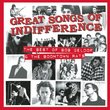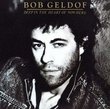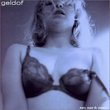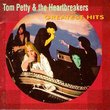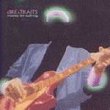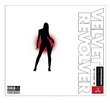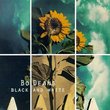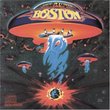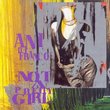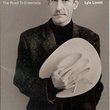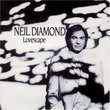| All Artists: Bob Geldof Title: Vegetarians of Love Members Wishing: 1 Total Copies: 0 Label: Atlantic / Wea Release Date: 8/13/1990 Genres: Alternative Rock, International Music, Pop, Rock Styles: Hardcore & Punk, New Wave & Post-Punk, Europe, Britain & Ireland Number of Discs: 1 SwapaCD Credits: 1 UPC: 075678204128 |
Search - Bob Geldof :: Vegetarians of Love
 | Bob Geldof Vegetarians of Love Genres: Alternative Rock, International Music, Pop, Rock
1990 solo album for the former Boomtown Rats frontman. Guests include Paul Carrack, Kevin Godley & Dave Stewart. Produced by Rupert Hine. 12 tracks. |
CD DetailsSynopsis
Album Description 1990 solo album for the former Boomtown Rats frontman. Guests include Paul Carrack, Kevin Godley & Dave Stewart. Produced by Rupert Hine. 12 tracks. Similar CDs
Similarly Requested CDs
|
CD ReviewsThis is the breath, this is the kiss. Robert P. Inverarity | Silicon Valley, California, United States | 06/05/2004 (5 out of 5 stars) "There are few albums both this excellent and this obscure. Though Bob Geldof is one of the most interesting people in the music business, he misfires as much as (arguably more than) any other musician. By contrast to his other solo albums, "Vegetarians of Love" strikes the perfect balance between humor and pain. It's easily the most humane album I've heard, finding humor in the blackest facts of existence and not concealing mortality in its most joyous moments.The album starts off strong, with the strongly Dylanesque "A Gospel Song." Right away, the album's unique blend of instruments (New Orleans accordions, Irish fiddles, and Paul Carrack's organ (!) combine remarkably effectively here) comes to the fore. This song was a grower; the high point is the emotional understanding in St. Bob's voice in the "It makes you cry" bits before each "chorus". The song is Dylanesque, too, for the perverse use of perspective it uses: a former lover talking to a friend and current lover of the woman in question...?"Love or Something", a collaboration with Dave Stewart of the Eurythmics, is an up-tempo and unabashedly poppy love song; out of context, as on Loudmouth, it's not very involving, but placed where it is and placed in the context of the rest of the album (I'm using the American release; YMMV), it's a bittersweet celebration of and complaint about love and aging. And jeesh is it hard to resist.The transition from "Going to a Go Go" to frustration with these damn human things and apocalyptic desolation would kill most albums stone dead, but not this one. It helps that the Great Song of Indifference is a blazingly ironic effort, with Bob first kissing off his relationship, then the person's life, then himself, the government, the nation, the entire third world, and then the earth in general. O catharsis. And then he smirks that sin's a social engineer and we go through another rousing round of "Na na nas". If it were anyone else besides the Live Aid guy, it would be incredibly offensive. Maybe it should be anyway. It's still one of the best songs ever written.An even better, if much more serious, track follows: "Thinking Voyager 2-type Things" (co-authored with Pete Briquette of the Rats). It's both more and less weird than the title makes it seem, but at the core it's a celebration of life, an invocation of the creative impulse in all its forms, from sex to spacecraft. It's transfixing from the resurrection of Brendan Behan to the last promise to turn up the signal of Voyager 2. If ever you've looked at the stars with a sense of wonder, if ever you've gone back with your partner to that special place with a broken heater, if you've ever felt the urge to _create_, you need to hear this song."Big Romantic Stuff" addresses more mundane matters, specifically the unquenchable need for excitement and narrative (and music!) in our lives. It's a female mid-life crisis song; I'm a 22-year-old male and it makes ME laugh and think and feel."Crucified Me" is the album's darkest moment, with love becoming a crucifixion. Hey, if you knew Paula Yates, you'd understand. It's moving but not very relevant to me. It fleshes out "painful, passionate obsession" in the catalog of human nature, though.A-and social ills are here again! "The Chains of Pain", co-written with Danny Mitchell (of the Messengers), makes coy reference to some politician named George in its cryptic first verse, reminiscent of Dylan's "Highway 61 Revisited," but quickly becomes more direct: it's about smashing the broken bonds that hold you in captivity to pain, and on this fifteenth anniversary of the Tiananmen Square massacre the song's celebration of the lives of the murdered demonstrators is still riveting."A Rose at Night" seems more prolonged at 5:43 than "Walking Back to Happiness" does at 7:33. "Rose" is a bit meandering; I'm still not sure what the point of it is. The words are evocative, though, seeming to be about understandings reached too late, and the music is as warm as an summer evening's breeze. "No Small Wonder" celebrates the mind's power to take us away from quotidiana. Geldof is a musician who has worked hard in his life and it shows in this song. The line "It's no small wonder" is delivered each time with both irony and awe, and if you know of any other song that combines the two this well be sure to recommend it!"Walking Back to Happiness" is the final masterwork of the album. It's the endorphin rush after the knock-out fight, the warm, calm glow after you've just been thrown out of the house. Luckily Helen Shapiro has two arms, one for Bob and one for me.But it wouldn't be a great album if it ended here, peacefully as it would. Instead Bob grabs us all by the shoulders and gives us a thorough shake with "Let It Go", a expression of what happens when frustration and love collide. "Is this religion without priest, prayers, or pews?" Bob asks; most of us know well enough that the answer is yes.And, lest we leave either too happy or too sad, there's yet one last comic annihilation. "The End of the World" is unabashed and deeply-felt parody, one more chicken little saying, "Oh, you bleeps, you're gonna get it for what you're doing. Eventually." Where else are you gonna hear Bob Geldof lump himself in with "Nostradamus and Jesus and Buddah", anyway? It's a funny and bleak ending to the album.So, Bob's covered creation, growth, love, sex, age, and death; done it with humor, honesty, compassion, charm, and soul; and completely avoided resorting to cliche, sap, or melodrama. Can you really ask for more in an album, or in any work of art? I vote no." If you can find it, buy it! Blake S. | Alberta, Canada | 04/29/2001 (4 out of 5 stars) "Vegetarians reveals a wide range and depth of the man, Sir Bob Geldof (yeah, he's the guy that organized that famine relief song, "Do They Know It's Christmas"). Bob is a poet and a social commentator but he tries not to take himself too seriously (although, ironically, he does take that role seriously). Some of the Songs are catchy, some, quite frankly, never grew on me, but still, overall the album is "no small wonder". I am shocked and disappointed that more music fans did not catch on to Geldof, especially in this last wave of Celtic-Folk appreciation. His albums are so well produced and balanced--one minute you're dancing, the next, you're sitting quietly listening to Bob narrate a little "slice of life" in his wonderful accent. Bob is the kind of guy that can sing a song like "Crucified Me" or "The End of the World" and at the end of it all...smile, and you smile with him. The only album I'd recommend above Vegetarians is his album "Happy Club". Also, I love the fact that on a few songs you can hear Bob talk to the engineers or his musicians prior to and as some songs are beginning." One of the best czargill | Oakland, CA | 07/17/2000 (5 out of 5 stars) "Geldof is truly at his best on Vegetarians. I snapped up 3 copies of this disc back in the early 90's before it was deleted and it has proven a wise investment. The songs are a stirring mix of Cajun and Celtic, with a little self-mocking and a twist of cynicism. "A Gospel Song" has to be one of the great lost-love songs of all time, and the catchy "Love or Something" showcases Geldof's tremendous talent for laid back understatement. "The Great Song of Indifference", a hit single in the UK in 1990 (#15) shows a streak of self mockery that Geldof writes of so well in his autobiography, "Is That It?". Well worth the investment of a few dollars at a garage sale, which sadly seems to be the only place it is to be found any more..."
|

 Track Listings (12) - Disc #1
Track Listings (12) - Disc #1
